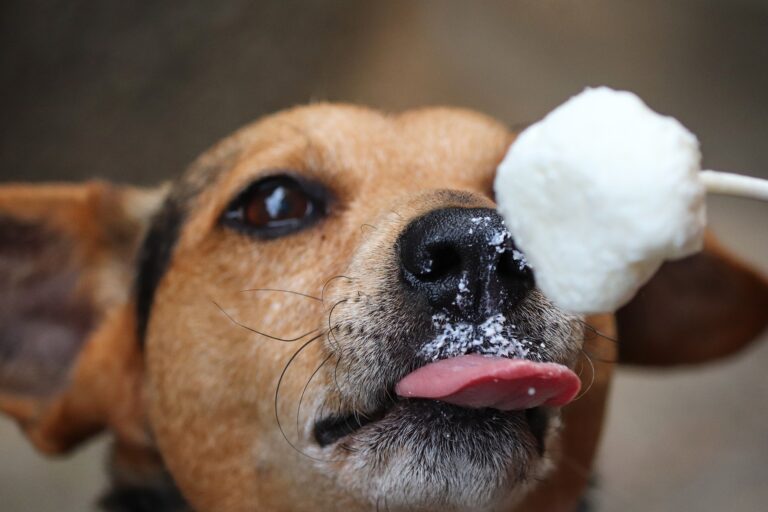Ice cubes clinking in a glass on a hot summer day can be quite tempting for both humans and their furry companions. But when it comes to offering ice to dogs, questions about safety often arise. Can dogs enjoy a refreshing ice cube on a sweltering day without any concerns? In this article, we’ll explore whether ice is safe for dogs to eat, backed by expert insights, to help you make the best choices for your canine friend’s well-being.
The Cooling Temptation, let’s explore the cooling temptation and the considerations surrounding it in more detail:
Scorching Summer Heat: During the hot summer months, dogs, like humans, can experience discomfort and even health issues due to the sweltering temperatures. Dogs have limited means of regulating their body temperature, primarily relying on panting to dissipate heat. When the weather is scorching, they can easily become overheated and dehydrated.
Refreshing Relief: The concept of giving dogs a piece of ice as a cool treat is rooted in the idea of providing them with relief from the heat. Ice offers a quick and refreshing way to help lower a dog’s body temperature and make them more comfortable. It can be especially appealing when you observe your dog panting heavily or seeking out shade to escape the heat.
Hydration Encouragement: One of the significant benefits of offering ice to dogs is its potential to encourage hydration. Some dogs may be hesitant to drink water, but they might be more inclined to chew on ice cubes. This can help ensure that they remain adequately hydrated, which is vital for their overall health and well-being, especially in hot weather.
Entertainment Value: Beyond its cooling effect, dogs often find the texture and act of chewing on ice enjoyable and entertaining. It can serve as a simple and engaging activity for them, helping alleviate boredom during the summer months.
However, while the idea of giving dogs ice cubes as a cooling treat is well-intentioned, it’s crucial to strike a balance between providing relief from the heat and ensuring their safety. Not all dogs react the same way to ice, and there are potential risks to consider, as mentioned in the article.
For instance, some dogs may bite down too hard on ice cubes, putting their dental health at risk. Others might gulp down ice pieces quickly, increasing the risk of choking. Additionally, dogs with certain dental issues or sensitivities might find chewing on ice uncomfortable or even painful.
Expert Opinion:
Dr. Sarah Johnson, a renowned veterinarian with years of experience, offers her perspective on this common question. According to Dr. Johnson, “Ice can be a refreshing and safe treat for most dogs. However, there are a few precautions to keep in mind to ensure it doesn’t pose any harm.”
The Pros of Ice for Dogs:
Hydration: Ice can be an effective way to encourage your dog to drink more water, especially if they are reluctant to do so. Chewing on ice cubes can be enticing and help prevent dehydration during hot weather.
Cooling Effect: Just like humans, dogs can benefit from the cooling effect of ice on a hot day. It can help lower their body temperature and make them more comfortable in high temperatures.
Dental Health: Chewing on ice cubes can provide some dental benefits for dogs. The abrasive texture of ice can help remove plaque and tartar from their teeth, promoting better oral health.
Calorie-Free: Ice is calorie-free, making it a suitable treat for dogs on a diet or those prone to weight gain.
The Caveats:
While ice can be a safe and enjoyable treat for most dogs, there are a few important considerations to keep in mind:
Supervision: Always supervise your dog while they are eating ice to ensure they don’t bite down too hard and risk damaging their teeth. Some dogs may be more enthusiastic chewers than others.
Size and Shape: Use appropriately sized ice cubes or crushed ice to prevent choking hazards, especially for small breeds or puppies.
Sensitive Teeth: If your dog has sensitive teeth or a dental condition, consult your veterinarian before offering ice to avoid any discomfort.
Moderation: Like any treat, ice should be given in moderation. Overindulgence in ice can lead to digestive discomfort, although this is relatively rare.
Conclusion:
In summary, ice can be a safe and refreshing treat for most dogs, offering hydration, a cooling effect, and potential dental benefits. However, responsible pet ownership involves knowing your dog’s preferences and limitations. Always supervise ice consumption, consider your dog’s dental health, and consult your veterinarian if you have concerns. By offering ice in moderation and with care, you can help your furry friend enjoy a cool and delightful treat during hot weather without compromising their well-being.


